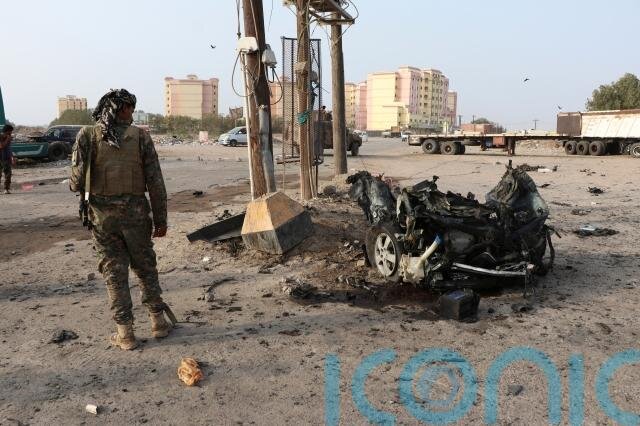Hopes of Yemeni people for peace must be translated into reality

It is highly expected that a UN-brokered two-month truce in Yemen, that went into force on Saturday morning, would uphold so that the warring sides would begin to heal the wounds of seven years of absurd and senseless war.
The ceasefire is a giant step forward and a great opportunity.
"This truce is indeed good, an excellent thing, but let's see how it is actually implemented ... Should the strikes on Sanaa stop, the airport open, Hodeidah port open, then we will feel there is a truce, that it has something tangible," said Najeeb al-Bashiri, a government employee.
In a statement, the UN special envoy Hans Grundberg stressed the importance of building on the agreement to restore trust between the warring parties and resume a political process aimed at ending the conflict.
“The aim of this truce is to give Yemenis a necessary break from violence, relief from the humanitarian suffering, and most importantly hope that an end to this conflict is possible,” Grundberg said, the Guardian reported.
The terms of the truce include facilitating the entry of 18 fuel ships into the ports of Hodeida and allowing two commercial flights a week to and from Sana’a airport to predetermined destinations. The terms also include convening a meeting between the parties to agree on opening roads in the city of Taiz and elsewhere to improve civilians’ freedom of movement inside Yemen.
“My heartfelt congratulations to all Yemenis on the start of the holy month of Ramadan,” Grundberg said. “I hope the onset of this truce will give Yemenis a chance to celebrate the holy month in peace, safety and tranquility.”
The truce has been warmly welcomed by Iran. It has been Iran’s great wish that guns would be silenced in Yemen. The war in Yemen has been purely fratricide, whether Yemenis against Yemenis or the Saudis against Yemenis.
Now that Yemeni people are eying on a permanent ceasefire and peace, it is not expedient to review that the tragedies and sufferings that the Yemeni people, especially children and women, have suffered. However, Saudi Arabia made a strategic miscalculation when it started a war against the Yemeni Ansarallah movement, also called Houthis, in March 2015 to restore the toppled government of Abd-Rabbu Mansour Hadi.
Instead of launching war on its neighbor to return Mansour Hadi, a Saudi ally, to power, rulers in Riyadh should have mediated between the warring sides for a power-sharing government in Yemen.
Iran’s letter to then UN Secretary General Ban Ki-moon in April 2015, especially Tehran’s emphasis on power-sharing through intra-Yemeni dialogue, unfortunately went unnoticed by the Saudis. The inexperienced Saudi de facto leader Mohammed bin Salman (MBS) had the illusion that he could achieve his goals in Yemen in a matter of weeks. However, he brought shame and humiliation for the Saudi kingdom.
The rebellion against Yemeni ruling system, which was influenced by the Arab Spring, was not something unexpected. However, MBS wanted to change the course of history and silence dissenting voices in the doorstep.
If certain Arab countries escaped unscathed from the revolt against corruption, unemployment, injustice and repression that started first in Tunisia in the early 2010s, it was mainly because these countries were rich and their people were enjoying a satisfactory standard of living. In fact, corruption and political repression lost color in the rich Arab countries, although the Bahrainis protested against discrimination and religious minorities in Saudi Arabia also sought justice.
Surely, Saudi Arabia would have been enjoying a better place today if it had mediated between the sides that were clashing for power in Yemen. Unfortunately, Saudi Arabia was, and still may be, oblivious of the fact that it enjoyed a respectable place in the Arab world and the Muslim nations at large and entered the war in favor of one of factions.
It is quite clear that Yemen doesn’t just belong to the Houthis or other rival factions. Yemen belongs to all Yemenis, and all groups must be given a share in determining the fate of their country.
Regrettably, the United Arab Emirates and some other Arab states also joined Saudi Arabia in the war against the Houthis in Yemen. In later years, some of these countries withdrew their support for the war, but the UAE remained in the Saudi-led coalition against Yemen. As a country which has made miraculous economic progress within just a few decades, the UAE was not expected to be caught in such a quagmire and frighten investors.
However, let’s look to the future and use the mistakes of the past as a light to build on the future and establish peace in Yemen.
Saudi Arabia, which have been controlling Yemen’s seas and airspace, must strictly stick to the ceasefire. It must think of the post-war Yemen. The rulers in Riyadh, particularly MBS, are morally responsible for the sufferings of the Yemeni people all through these seven years.
"We welcome this essential development for millions of Yemenis who need a respite after years of relentless fighting," said the Norwegian Refugee Council, a humanitarian agency operating in Yemen. "We really hope this is the start of a new chapter."
Let’s pin hope that cool heads have prevailed in Riyadh and another mentality would rule Saudi Arabia once peace is established in Yemen.
Yemenis whose country has been ravaged by the seven-year war that has forced millions into hunger, poverty and homelessness want peace and respect to rights.
